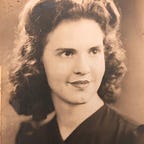The Roughest Customers In Michigan Bars
Don’t let the blue hair and bifocals fool you.
The Haven interrupts its regular publishing to report the death of the bouncer who warned that the toughest customers in Michigan bars were the ones wearing muumuus and pearls.
Miss Wanda Newaygo was a cooler (head bouncer) on the Leelanau, a peninsula in Michigan’s Up North known for vast cherry orchards, scenic Lake Michigan beaches, and rowdy bars. That last wasn’t surprising: all Up North taverns attract hooligans, no-accounts, riffraff, gasbags, and assbags. And they weren’t a problem — if bouncers managed them effectively.
Rookie bouncers didn’t. They considered them all to be equal threats. Trouble was, if a bouncer expended her energy on blowhards during Happy Hour, she’d lack the energy to subdue serious troublemakers at Closing Time. The trick, according to Miss Newaygo, was to differentiate the one from the other, and use excessive force accordingly.
For example, novice bouncers worried when the Leelanau’s touch-football teams were on the premises. They were male and female jocks in their forties. (Ok, most were pushing fifty. And some had been pulling fifty for over ten years.) They scrimmaged in county parks on Saturday mornings in the Fall. Then they spent the afternoons in bars watching college games on TV over burgers and Pabst.
Trouble was, play didn’t end when the teams left the field. Players committed “Pass Interference” by grabbing beers off trays carried by waitresses headed for the opposing team’s table. Engaged in “Roughing The Eater” by jostling seated opponents who were trying to eat. Committed “Encroachment” by standing right behind players trying to take care of business at urinals. And “Personal Fouls” if the players were seated in stalls.
Yes, touch-footballers were obnoxious. But Miss Newaygo told her bouncers to ignore them. After a game, the players were too ibuprofened, Bengayed, and ACE-wrapped to tussle. They were only fence-fighting dogs: lots of bark, but no bite. Indeed, they couldn’t be much of a threat — not when they played for teams called the Gills Pier Arthritics; Northport Has-Beens; Leland Agony-of-Da-Feeters; and Glen Arbor Don’t-Hurt-Me’s.
Women’s fastpitch softball teams were another matter. Their players were serious athletes and intense competitors. Like the touch-footballers, they went to bars after games to celebrate their wins or grouse about their losses. But if a game’s winner and loser were in the same joint, it went into extra innings.
With luck, they only engaged in heckling. Of each other’s outfielders: “Cinderella could get to the ball faster than you.” Their batters: “I’ve seen better swings at playgrounds.” And their pitchers: “You’ve got as much control as two rabbits on a first date.”
But the situation could easily go south. Say, when someone went to the ladies room nearest her team’s table, entered a stall an opposing player just left, took her seat — and realized the preceding “pitcher” had completely missed the “strike zone.” Or did their business, tried to get up — and found themselves stuck, because the seat had been swiped with a batter’s pine tar rag. That was when the benches cleared and players swung for the cheap seats.
Women softballers were an example of customers who disturbed the peace. Miss Newaygo also warned bouncers about the ones who’d shatter it.
Such as the alumni of Future Farmers of America and 4-H clubs. During their teens, FFA and Four-Aitchers competed against each other at county fairs, cattle shows, swine seminars, and fertilizer symposiums. Though now adults, they still held grudges against the farmers to whom they’d lost. And wanted to re-rub the noses of those they’d beaten in pig dip.
Rookie bouncers didn’t appreciate the danger when former Four-Aitchers and Future Farmers were on the premises. After all, their clubs had such cute names: the Glen Haven Heifer Huggers, Peshawbestown Pea Flailers, and Suttons Bay Udder Tuggers. And FFA and 4-H taught teens to be respectful of others. As adults, however, they adopted the Up North Farmer Code. And Rule #1 was: when it came to your livestock or crops, don’t take guff off anyone.
Thus, when former Four-Aitchers and Future Farmers encountered each other in bars, it went like this. A Future Farmer would tell a Four-Aitcher “Your hay baler’s so old, it gathered the straw used in Baby Jesus’ manger.” The Four-Aitcher would reply “Your tractor’s so ugly, dirt in the field turns over without being plowed just to keep from looking at it.” The Farmer would come back with “Your dog’s so dumb, he’d hump a bull if someone held its horns.” The Four-Aitcher would respond “You ain’t got the brains God gave the south end of a northbound horse.” After that, John Deere tractors couldn’t pull them apart.
Rough as those customers were, the roughest, according to Miss Newaygo, were the crochet clubs and knitting circles which met at her bar. Don’t be fooled, she said, by their matronly figures and pleasant demeanors. Their kindly eyes behind wire-rimmed spectacles. The pixie cuts, bobs, and tied-back buns. The floral-print muumuus and comfortable sneakers. Nor the walnut canes and aluminum walkers.
One moment, they’d be at opposite ends of the room, sipping Old Fashioneds, trading gossip, and making grandbaby blankies. Then a crocheter, pretending to speak to friends, would loudly remark that knitters needed two needles to make what a crocheter could with just one hook. A knitter would respond that she could purl a poncho with the yarn a crocheter wasted to make a lousy dish rag. A crocheter, grabbing her cane and getting to her feet, would declare “at least we don’t need a pattern to make something.” A knitter, squaring off in front of her, would reply “crocheters need a pattern for one thing: to satisfy their men.” That’s when the knitting needles and crochet hooks came out.
